
This year it seems like the whole world has engaged in a mass election cycle and whether you’re voting on July 4th1 in the UK, or November 5th2 in USA—or at any other time this year—you’ve probably invested a good deal of time considering who you should vote for, why the state of democracy is what it is, and what the most important factors are where you live. As Christians, it’s important that we assess our own thoughts, and the information we absorb, but on top of that we should wisely consider how we vote too.
I’m 99% sure who I’ll be voting for come July, but in the twenty days leading up to that, sin will be crouching at my door, waiting to be allowed in. The same might well be true of you. You might live in a household with a variety of voting intentions, perhaps your son or daughter will be voting for the first time this year and that has caused some degree of contention. Down the pub or on Sunday mornings it’s possible that politics has been banned, but it’s just as likely that someone didn’t get that memo, and is espousing the complete opposite view to the one you hold.
As we journey ever closer to the ballot box, it should be our aim to walk along the path of righteousness, rather than trespassing on unholy soil. Here are a couple of ways we can do that well.
Prayer → Together
I used to run a Friday morning prayer group that met at 6:30am. We would pray together for an hour, at least, and often people would stick around afterwards to discuss various joys and sorrows. If you asked any of the members of that group to come up with a quote from me, they would likely say the following:
“Private prayer feeds corporate prayer, corporate prayer feeds private prayer”
Sometimes we would pray for one another and someone was left wishing they could have prayed for someone in particular, so I encouraged them to do so on their own time. Sometimes we’d pray for our leaders, both in and outside the church, which should then have continued throughout the week. On other occasions, people would bring what they had been wrestling in prayer over that week, and we would amplify that prayer in chorus, harmonising with our own voices and perspectives as we did so.
We’re called to be known for our love for one another, and that calling doesn’t disappear when elections roll around. In fact, whilst parties and leaders are busy studying for diplomas in political assassination, we should studying our own hearts and bringing them before the Lord for testing. Have we loved our neighbours well in this season? Are we leading our families well? If someone asked your children or your spouse whether you hoped more in the elections than in the reign of Christ, what would they say?
In addition, we should be praying for unity in our nation, in our churches, and in our homes. Why not start to pray for the upcoming Prime Minister now? If those around you know that you don’t agree with the policies of that leader, how much more important is it to lead them in prayer before dinner each night and lift the PM-to-be up to God, asking the true King to provide him with wisdom and Godly insight?
You could also pray with your family—especially for those of you with differing views—that the blood of Christ would sustain you and your relationship until and beyond July 4th3.
So, during this season, pray, pray for yourself, pray for your leaders, and pray for and with one another.
That will make all the difference.
Understanding
The book of Proverbs often repeats the word understanding in conjunction with wisdom.
We’ve long eschewed the idea of wisdom in western society, and I think it shows. The concept of wisdom has been noticeably absent in the debates so far, and the news cycle seems to have little time for it either. One of the primary indicators for this is the inability to understand the things we disagree with. Strawmen tarry far longer than they ought to in today’s discourse, and they seem to be multiplying by the day.
One of the main ways we can deal with this is by applying wisdom to our knowledge.
Here’s a simple way of looking at how that bears out practically:
Wisdom is essentially a balance between our knowledge of man and our knowledge of God. The more we understand God, the more we understand ourselves and others, and the more we understand man, then more we understand sin, shame, struggles, differences, opinions, etc. Politics gives ample opportunity to exercise this, with plenty of opposing opinions for us consider and work through.
The red lines on the graph above plot out a reasonably generous representation of the average understanding common among people today. People understand themselves fairly well. They might have some idea about God and a bit more about the state of man after the fall; and finally, I think the average person’s knowledge of others sits somewhere in the middle. During elections cycles, the ramifications of this heighten and are more distinctly dangerous, not just for politicians who are rightly worried about appearing in public4, but also for our own souls.
Though using the social internet5 people today can surround themselves with whomever they want, never even engaging with opposing dialogues, arguments, or theories. A few years ago, following the election, I remember seeing many people on social media up in arm about the outcome. The general refrain was, “I thought we all agreed we weren’t voting for them!” The stories were being posted by people who seemingly hadn’t spoken to anyone outside their political bubble, and so it felt like their whole world was tumbling down when things didn’t go as they’d assumed it would.
As Christians, this shouldn’t be true of us.
Though the second lines on the first graph are unachievable in this life, it’s what we should be shooting for as believers. Our churches are full of people from different cultures, cultural backgrounds, different classes, and in a variety of jobs and careers. Given our rich and diverse company, it should be far easier for us to seek wisdom, and have that wisdom affect our life—and the lives of those around us!
Knowledge of others alone, however, won’t fix our capacity for understanding. On the charts below, I’ve given some examples of people who have perfected three out of four points, failing on just one, and how that might affect their overall understanding.
I could write thousands of words on this, but let me just give you four ideas to consider. Firstly, God is sovereign and reigns right now and will for eternity, this means that whatever happens in this kingdom, God’s kingdom will not be shaken. Secondly, many people with the same information as you have come to very different conclusions. Christians will likely vote for every party in contention, and have their reasons for doing so. Thirdly, your vote is important, but not paramount. Finally, we’re all sinners, no leader, no MP, no pastor and no voter is perfect.
Each of the points on this graph can help us to understand the world around us, and the microcosm of that world that surfaces during elections. Let’s be prayerful and hopeful that over time our presence on this graph would expand, and that we would grow more hopeful and more understanding as a result.
Why not plot out your own graph, especially as it pertains to this election. Note down some of the ways you might be able to expand those points that aren’t as broad as you’d like. How might that affect the way that you vote, and how you’ll react regardless of the outcome?
As you wait in line on election day you’ll see people bearing invisible red, blue, yellow, and navy flags. Imagine if you were there right now and the flags became visible to you. What would be your gut reaction? How might you improve that over the next twenty days, and beyond?
20…19…18…17…
The countdown has begun.
We don’t have much time left, and so you probably can’t change where you’re voting, you certainly can’t change when it will occur, and you’ve likely chosen who you’re voting for and why you’re voting them.
However.
You have a choice to make still about how you will vote.
Will you place that vote before the foot of the cross? Will you walk into the polling station on July 4th with understanding? Have you made a choice to lead your family well, no matter how they are voting? Will you pray for your Prime Minister, whoever they are?
I think we’ll both struggle in our own ways, but why not struggle together?
Grace and Peace,
Adsum Try Ravenhill
Recommended Reading for the Week
- Our New Religion Isn’t Enough
Glen Scrivener - Ayaan Hirsi Ali vs Richard Dawkins - Commentary
Gavin Ortlund - Was Pacifism the Early Church’s View?
Finally, a fun one for you, I really enjoyed this article on longing for the Medieval Church by
’s James Cary, and I think you will too.USA Independence Day, or Fireworks Night
Guy Fawkes Night in the UK, or… Fireworks Night
Or whenever your election happens to be.
MPs and political candidates on all sides have raised concerns in recent years, even more so now during the election:
https://www.telegraph.co.uk/politics/2024/06/12/home-office-offers-nigel-farage-extra-security-milkshake/
https://amp.theguardian.com/politics/2024/feb/23/british-mps-fearful-of-violent-attacks-as-tensions-over-gaza-war-increase-threats
https://www.telegraph.co.uk/politics/2024/06/12/perils-facing-mps-on-the-campaign-trail/






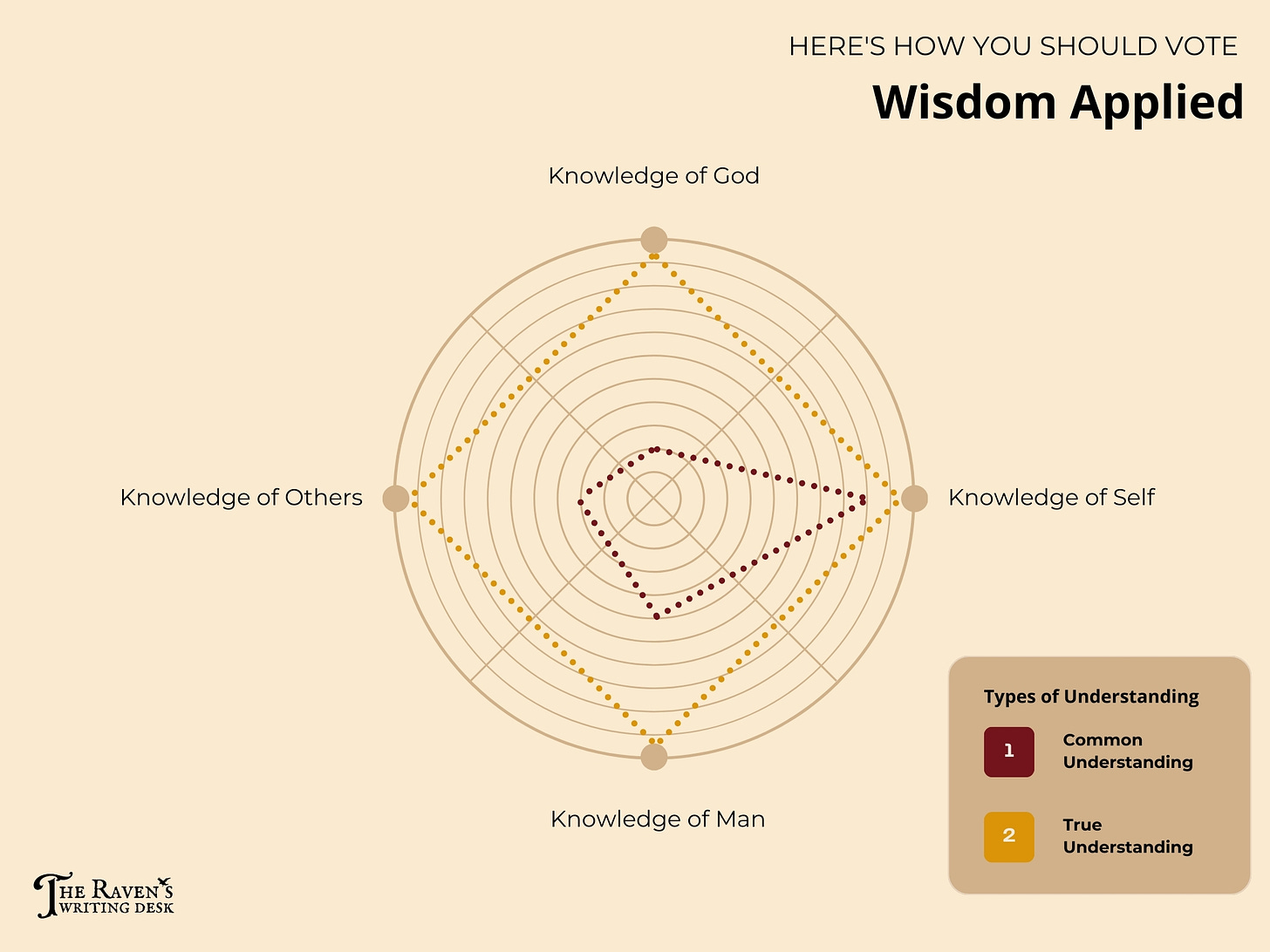
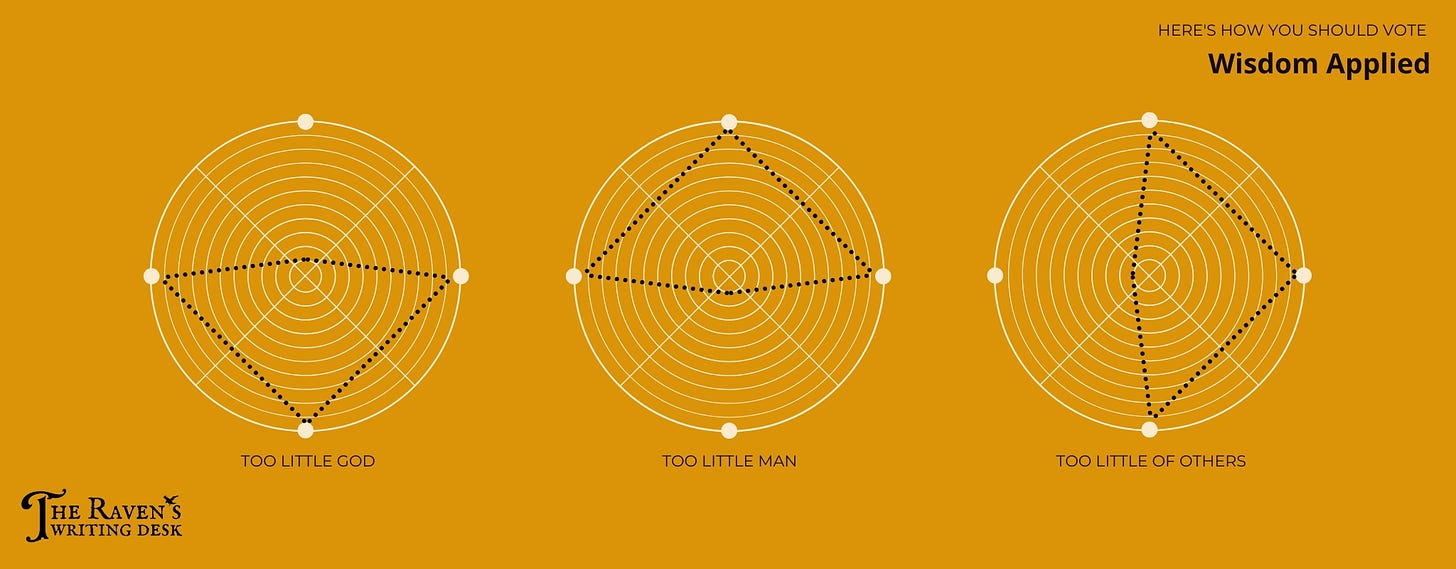
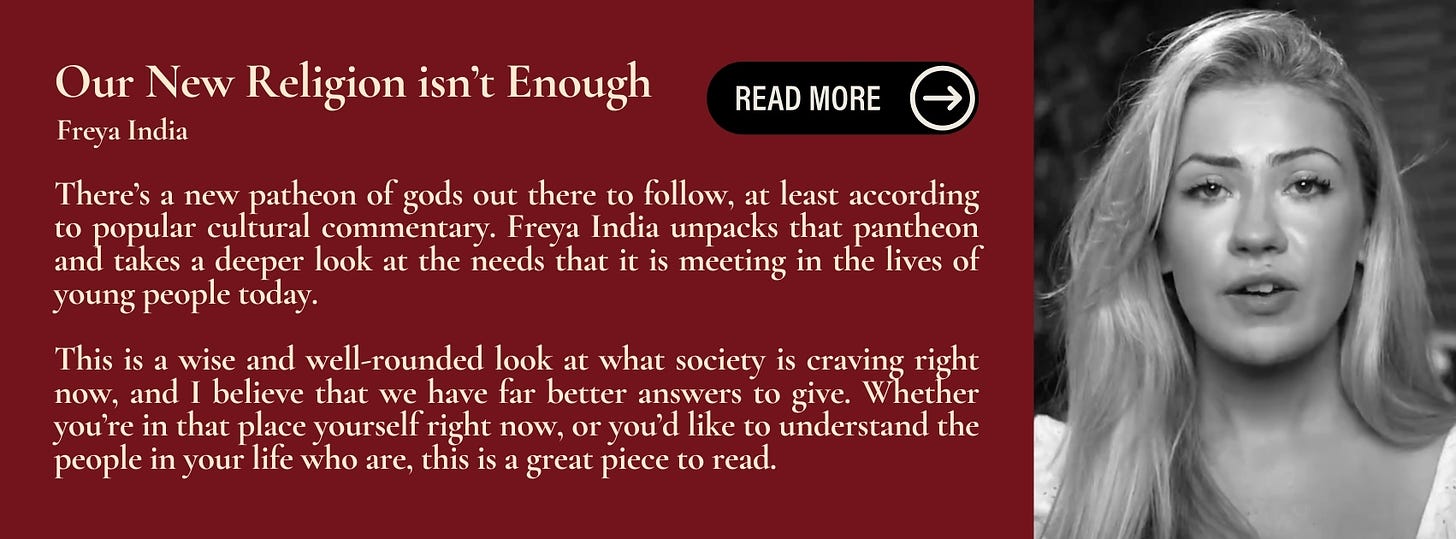
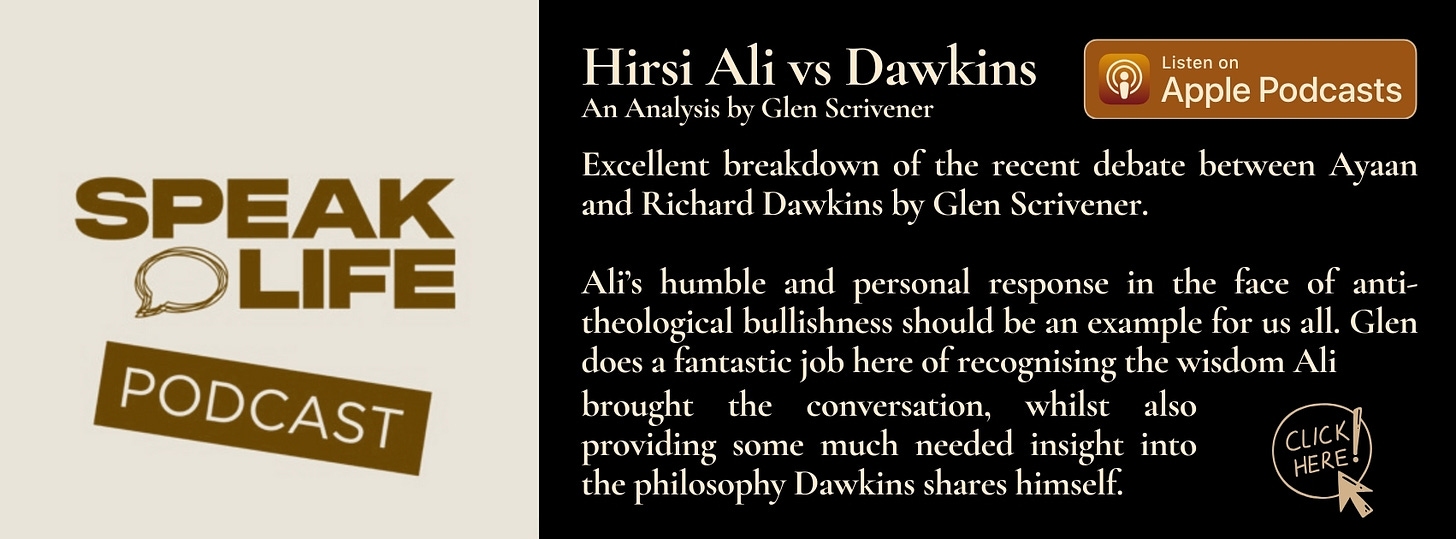
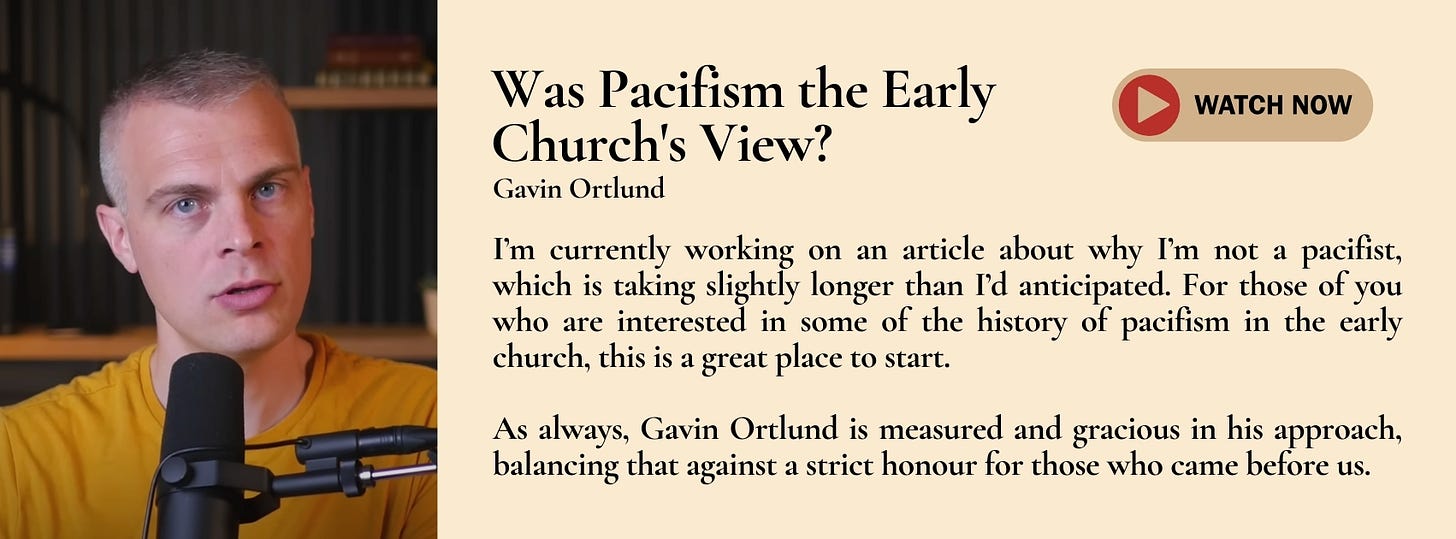

Super helpful and timely for your American friends. :)
Great article and helpful to consider how to vote!